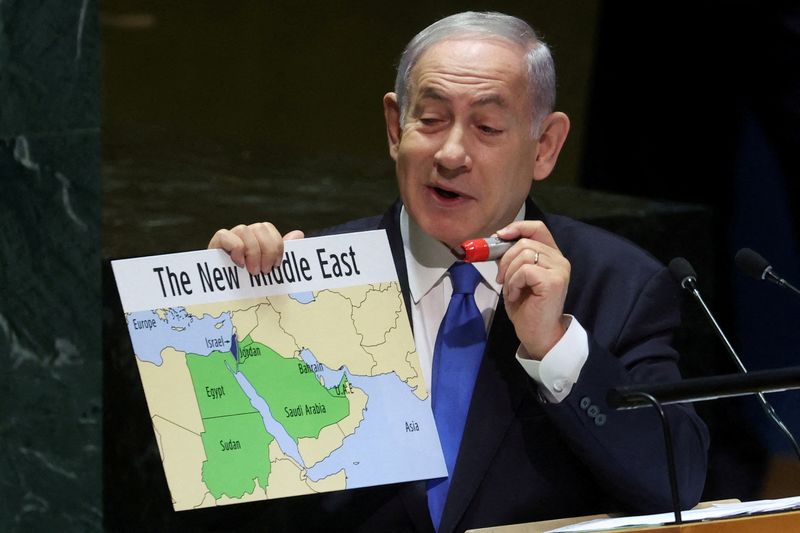
©Reuters. FILE PHOTO: Israeli Prime Minister Benjamin Netanyahu addresses the 78th UN General Assembly at the UN Headquarters in New York City, New York, U.S., September 22, 2023. REUTERS/Mike Segar
JERUSALEM (Reuters) – Israeli Prime Minister Benjamin Netanyahu presented his first official “day after” plan for the Gaza Strip once the war ends, saying Israel will maintain security control over all Palestinian areas and carry out reconstruction of Gaza dependent on its demilitarization.
The document proposes that Israel maintain security control over all territory west of Jordan, including the occupied West Bank and Gaza – territories where the Palestinians hope to create an independent state.
It was quickly dismissed by Palestinian officials as doomed to failure.
Netanyahu presented the plan to the security cabinet on Thursday, which could still ask for changes. He was seen by Reuters on Friday.
In the long-term goals listed, Netanayhu rejects “unilateral recognition” of a Palestinian state. According to him, an agreement with the Palestinians will be reached only through direct negotiations between the two sides – without naming which Palestinian party would be.
In Gaza, Netanyahu outlines demilitarization and deradicalization as goals to be achieved in the medium term. He does not explain when that intermediate phase would begin or how long it would last. But he conditions the rehabilitation of the Gaza Strip, much of which has been devastated by the Israeli offensive, on its complete demilitarization.
Netanyahu proposes that Israel have a presence on the Gaza-Egypt border, in the south of the enclave, and cooperate with Egypt and the United States in that area to prevent smuggling attempts, including at the Rafah crossing.
To replace the Hamas government in Gaza while maintaining law and order, Netanyahu suggests working with local representatives “who are not affiliated with terrorist countries or groups and are not financially supported by them.”
It calls for closing the United Nations agency for Palestinian refugees, UNRWA, and replacing it with other international humanitarian groups.
“The prime minister’s statement of principles reflects broad public consensus on the objectives of the war and the replacement of the Hamas government in Gaza with a civilian alternative,” read a statement from the prime minister’s office.
The document was distributed to members of the security cabinet to initiate a discussion on the issue.
The war was triggered by a Hamas-led attack in southern Israel on October 7 in which 1,200 people were killed and 253 taken hostage, according to Israeli tallies.
Vowing to destroy Hamas, Israel responded with an air and ground attack on besieged Gaza that killed more than 29,400 people, according to Palestinian health authorities. The offensive displaced most of the territory’s population and caused widespread hunger and disease.
Palestinian President Mahmoud Abbas’s spokesman, Nabil Abu Rudeineh, told Reuters that Netanyahu’s proposal was doomed to fail, as were any Israeli plans to change the geographic and demographic reality of Gaza.
“If the world is truly interested in security and stability in the region, it must end the Israeli occupation of Palestinian land and recognize an independent Palestinian state with Jerusalem as its capital,” he said.
The war in Gaza has revived international calls – including from Israel’s main backer, the United States – for a so-called two-state solution as the ultimate goal for resolving the decades-long Israeli-Palestinian conflict.
Little progress has been made towards achieving Palestinian statehood since the signing of the Oslo Accords in the early 1990s. Among the obstacles preventing this is the expansion of Israeli settlements into territories conquered by Israel in the 1967 Middle East war.
Most countries view the settlements, which in many areas separate Palestinian communities from each other, as a violation of international law. Israel claims a biblical birthright to the land and said Thursday it will approve more than 3,000 new housing units in the settlements.